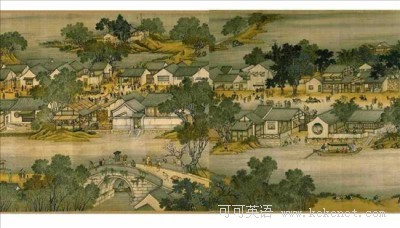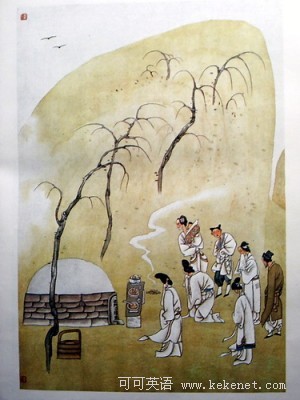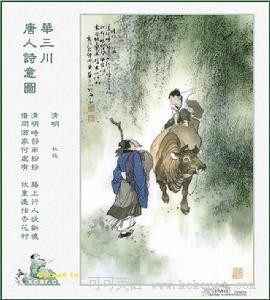(单词翻译:单击)
听力欣赏
清明,农历二十四节气之一。中国传统的清明节大约始于周代,距今已有二千五百多年的历史。清明作为节日,与纯粹的节气又有所不同。节气是我国物候变化、时令顺序的标志,而节日则包含着一定的风俗活动和某种纪念意义。
清明节也是最重要的祭祀节日,是祭祖和扫墓的日子。扫墓俗称上坟,祭祀死者的一种活动。汉族和一些少数民族大多都是在清明节扫墓。按照旧的习俗,扫墓时,人们要携带酒食果品、纸钱等物品到墓地,将食物供祭在亲人墓前,再将纸钱焚化,为坟墓培上新土,折几枝嫩绿的新枝插在坟上,然后叩头行礼祭拜,最后吃掉酒食回家。唐代诗人杜牧的诗《清明》曰:“清明时节雨纷纷,路上行人欲断魂。借问酒家何处有?牧童遥指杏花村。”写出了清明节的特殊气氛。

清明节还叫踏青节,按阳历来说,它是在每年的4月4日至6日之间,正是春光明媚草木吐绿的时节,也正是人们春游(古代叫踏青)的好时候,所以古人有清明踏青,并开展一系列体育活动的的习俗。在古时,还有一种说法,就是“三月节”。
Qingming, meaning clear and bright, is one of the 24 solar terms in China. The 24 solar terms represent the weather changes in a year. Peasants plan their farming work according to this schedule. Qingming usually occurs in early April of each year.
This year, the Qingming Festival falls on April 5, according to the solar calendar. To Chinese people, the Qingming Festival is an opportunity to remember and honor their ancestors at grave sites. In the traditional way, young and old pray before the ancestors, sweep the tombs and present food, tea, wine, joss paper and other offerings. Usually, the cemeteries are located at the outskirts of the city or town and the whole family will travel to the site and burn paper offerings there.
People believe their ancestors will see the smoke from the burning paper from heaven then they'll hear their prayers.
Tradition is one thing, but on the other hand, the smoke does pollute the air; people pouring out to the cemeteries causes traffic jams; and the paper burning can cause fires.

Therefore, in recent years, the idea of greening tomb sweeping day has emerged.
One of the most popular ideas is online cemeteries. Many big cemeteries have opened a virtual version online. Visitors log onto the Web site and follow the 3D map to find the tombs of their late relatives. Then they can clean the tomb, put flowers in front of it or even burn joss paper and light firecrackers all by a click of different buttons. They can also write a biography or some articles on the Internet to express their memories of family members who've passed away.
Ms. Qian is from Wuhan, capital of Hubei Province in Central China. Because of a busy work schedule, she has given up going to the cemetery with her family but has chosen to remember her late elders on the Internet.
"I don't have the time to really go to the tomb site. But still, I need to express my feelings. So the online cemetery is a convenient way for me. And on the other hand, the government also encourages us to practice a green tomb sweeping way."

Many young people like Ms. Qian have accepted this avant-garde idea. They think it is a good way to avoid the crowds, and believe true feelings of love and respect toward late family members are more important than how you commemorate them. However, the elder generation still thinks that going to the site in person and cleaning the tomb by hand is the best way to show your respect and love to the ancestors. In this case, other green tomb sweeping traditions are easier to accept.
This year, many cemeteries have set up stands at the gate. They've prepared free flowers for visitors to exchange for the joss paper and firecrackers they've brought.
"We prepared joss paper before we came. But when I saw these beautiful flowers, I decided to change the paper for flowers. Flowers may be a better way to express our grief and how much we miss them. And on the other hand, society calls for greener ways of tomb sweeping, to decrease pollution."
"Lighting firecrackers and burning joss paper damages the environment and can also cause fires easily. Flowers are much better."
Besides flowers, planting a tree instead of building a tomb is another offering that is being accepted by a growing number of people. It saves land and at the same time improves the environment.
How will you choose to honor your ancestors on Tomb Sweeping Day?
词汇解释
1.solar adj. 太阳的,太阳能的
Solar energy is a new kind of source of energy.
太阳能是一种新型能源。
2.grave[greiv] n. 坟墓,墓穴 adj. 严肃的,严重的,庄重的 adv. 缓慢庄严的 vt. 凿
She laid the bouquet on the newly turfed grave.
她把这束花放置在新铺上草皮的坟墓上。
3.joss paper n. (中国)祭祀所用之纸,纸钱
4.outskirts n. 郊区 名词outskirt的复数形式
On the outskirts they passed a steel mill.
他们在郊区从一家钢铁厂前面经过。
5.cemetery['semiteri] n. 墓地
He was buried in this cemetery.
他被安葬在这个公墓里。
6.avant-garde n. 先锋派 adj. 先锋的,前卫的
7.commemorate vt. 纪念
A monument was built to commemorate the victory.
为了纪念胜利,建造了一座纪念碑。
8.firecracker n. 爆竹,鞭炮
Chinese children like to buy many firecrackers before the Spring Festival.
中国孩子会在春节前买很多鞭炮。


